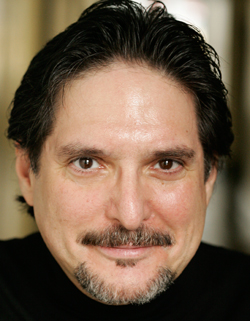REVIEW: Will George Soros Rule America?
|
by admin Monday, October 2, 2006 12:00 am Eastern Time |
Archives Comments |
Will George Soros Rule America
(with a little help from his friends, McCain-Feingold)?
A left-wing conspiracy so vast
by Wes Vernon
October 2, 2006
ON THE MORNING of Wednesday, November 8th, don’t be surprised if you wake up, turn on your radio or TV, and hear the voice of billionaire George Soros saying something akin to, “My America! I bought it, I paid for it, and I’m going to keep it!”
Not that Soros would use those exact words (a rather crude paraphrase of a vow Ronald Reagan once made about the U.S. keeping the Panama Canal when Jimmy Carter was giving it away). Soros is normally much too discreet and smart for that. But that’s just the kind of giddy braggadocio that would symbolize the man’s glee if the Democrats take over Congress in the mid-term elections.
George Soros, who made his first pile of money by betting against the British pound (for which the Brits paid dearly in sudden inflation), has created what amounts to a secret party within the ranks of the Democrat Party.
Former radicals David Horowitz and Richard Poe have exposed Soros’s vast secret network of private think tanks, foundations, stealth PACs, and other front groups that have crafted the agenda, the talking points – and most of all, the money – that have driven the Democrat Party’s agenda.
Horowitz and Poe expose the “Shadow Party” for its hidden history, dangerous motives, frightening ambitions, “and the twisted vision of its leader, George Soros.”
In their book Shadow Party: How George Soros, Hillary Clinton and Sixties Radicals Seized Control of the Democratic Party, we get the real story behind the McCain-Feingold Campaign Finance “Reform” Act. Behind the scenes in enacting that brazen assault on freedom of speech were George Soros and his Open Society Institute “and other Pewgate Foundations.” The law which was passed to “get the money out of politics [a prime Grade A fraud from the get-go, as the 2004 election demonstrated]” was actually manipulated into law by Soros and his well-funded allies for the express purpose of getting other people’s money out of politics, but not his.
The story begins with “Hillarycare,” the socialized medicine plan proposed by Hillary Clinton in the first two years of Bill Clinton’s presidency. One major reason that scheme was rejected by the American people was that it would have cut costs by rationing health care to the elderly. In other words Grandma and Grandpa could have been denied life-saving care, relieved only of immediate pain.
This is not unlike the health care systems in some European socialist countries – which liberals here often urge that we emulate – where the code words, if your life is deemed not worth saving, can best be translated as “Die, old man [or old woman]. Get out of the way. You’re a nuisance.”
Three weeks after the Republicans gained control of Congress in 1994 partly because of public pushback on Hillarycare, Soros spoke to a small group at Columbia University’s school of medicine. Horrified by the health care industry’s backing of the “Harry and Louise” TV ads that helped defeat Hillarycare, Soros told his audience that he intended to “do something” about what he called “the distortion of our electoral process by the excessive use of TV advertising.”
Just eight months later, Senators Russ Feingold (D-Wisc.) and John McCain (R-Ariz.) called for “comprehensive campaign finance reform legislation.” Ultimately their bill cleared Congress in 2002.
Its provisions were widely ignored, in many cases by the very politicians who had supported the legislation. But if you wanted to start up a group opposing a politician who wants to kick you out of your home to make way for a shopping mall, or a candidate who would deny you the right to know if your minor child is seeking an abortion, you are not allowed to buy radio or TV ads against that politician 30 days before his primary and 60 days before the general election. However, the major media – including such giants as Viacom, G.E., Disney, the New York Times, and others – have every right to say whatever they want. Curb “special interests?” Sure, and chickens have lips.
It was left to reporter Ryan Sager of the New York Post to expose (in March of 2005) the inside story that McCain-Feingold was pushed through Congress by fraud. Thus he broke open the “Pewgate” scandal – a tale of corruption of public discourse through a massive public brainwashing scheme worthy of Pravda and Joseph Goebbels. A young man who “talked out of school,” so to speak (whom this writer has seen on a video obtained by Sager) projects an appearance of believing he was doing good, seemingly oblivious to the massive deceit involved in the methodology of the campaign.
Sager got his hands on a taped boast by Sean P. Treglia, a former program officer of the Pew Charitable Trusts. Speaking in March 2004 at the Annenberg School of Communication, Treglia spilled the beans on a secret multimillion dollar scheme to hoodwink Congress into believing there was an outpouring of grassroots public demand for campaign finance “reform.”
The problem, Tregalia noted, was that backers of efforts to curb free and open debate through TV advertising “didn’t have a constituency that would punish Congress if they didn’t vote for reform.” Some, including this writer, reported during the McCain-Feingold debate that survey after survey clearly showed the public was not – in any way, shape, or form – banging on the doors of Congress demanding to “get the money out of politics.”
Flush with foundation money, the Shadow Party would buy “experts” and front groups all across America to create the impression on Capitol Hill that there was a demand for McCain-Feingold. “The target audience for all this activity,” Treglia boasted, “was 535 people in Washington [Congress].” The idea was to create “an impression that a mass movement was afoot – that everywhere they looked – in academic institutions, in the business community, in religious groups, in ethnic groups. Everywhere, people were talking about reform.”
One sympathetic individual in the audience wondered aloud as to what would have happened if the public had been made aware of the plan at the time. Treglia said, in effect, the media turned a blind eye to the whole thing.
Sager puts the Pew Charitable Trusts at the top of the list of those who kicked in the largest amount of the money to the brainwashing maneuver. But the George Soros Open Society Institute was right up there on the same list of the eight foundations that contributed $123.2 million to underwrite 88 percent of the total that was spent. Smaller contributors included Common Cause and Naderite interests.
Media manipulation included Pewgate-funded entities such as American Prospect magazine and National Public Radio (NPR). Bill Moyers, longtime PBS icon, through his own Schumann Center for Media and Democracy, was the number two Pewgate donor, but Moyers “also received Pewgate money and also promoted front groups funded by Pewgate foundations.” On his PBS TV program Frontline, according to Poe and Horowitz, Moyers interviewed three campaign finance advocates without informing his audience that all three “represented organizations funded by Moyers’ own Schumann Center.”
Pewgate tentacles even reached to the Supreme Court, which upheld McCain-Feingold. Many of the legal arguments used to persuade the Court to okay the law “derived from data cooked up by the Soros-funded Brennan Center at New York University.”
The foundations and other groups involved, when asked for comment, deny that there was any coordinated effort or that there was any meaningful contact between them. Any interlocking directorships or affiliations are coincidental, they maintain.
There is much more to be told about this elaborate undertaking, but space constraints prevent us from detailing it here and now. You can access Sager’s column and/or read The Shadow Party. Authors Poe and Horowitz write that it is “unlikely that such an immense and multifaceted operation as Pewgate could have succeeded without a strong leader at the top.”
George Soros, in his book Underwriting Democracy, excoriates Mikhail Gorbachev for his failure to take charge when the freedom forces toppled the Soviet Union. The billionaire financier lectures that “there must be a well-defined chain of command,” and that “someone must be in charge.”
Largely by the process of elimination, Poe and Horowitz pinpoint Soros as the one who played a “pivotal role” behind the scenes on the McCain-Feingold campaign. If that were his only venture into the public square, we could perhaps shrug our shoulders and say, “Well, he’s not the first rich man to use his money, brains, and forceful personality to create propaganda to advance a dubious cause.”
But the “Shadow Party” has big plans for you and me. And those plans are driven by George Soros, described by Poe and Horowitz as “The Shadow Party’s Lenin.” They state (and cite his own words to show) that “Soros is not content to be a passive investor. He intends to intervene in the process, and not in America’s favor.” He sees America the way the far left here and abroad has always viewed the U.S. – as a “threat to world peace and survival.” Here is a partial list of aims by Soros and various entities he has funded or otherwise encouraged:
The Shadow Party has a plan to rewrite the United States Constitution by 2020.
The Shadow Party seeks to overthrow foreign governments – and may attempt to use the same methods here.
The network has contributed vast amounts of money to the Democrats, which totaled more than $300 million in the 2004 elections, and is growing in influence over the Democrat Party’s message and policy.
Politicians on both sides of the aisle have exchanged favors with George Soros and his government-in-the-wings.
The Shadow Party has gone to great lengths to conceal its radical agenda behind the “moderate pose” of some “mainstream politicians.” If Hillary Clinton and John McCain face off in the 2008 presidential election, the Shadow party would have appealing (to them) candidates on both tickets. When the chips are down, however, the greater weight of its efforts would favor Hillary. McCain’s backing of the Iraq war (as opposed to Hillary’s fence-straddling) would settle that.
Soros “has assembled an army of radical allies who have long been at war with the American system, and he has done so because, notwithstanding his financial eminence, he is an outsider and a radical himself.” The Shadow Party “is not an American-style party, but is more like a Lenin-style party, fully as conspiratorial and just as unaccountable.” It is “the party of rebels, but also the party of rulers – a corporate unity of capital and labor. And it has insinuated itself into the heart of the American system.”
P.S. – Don’t look for the mainstream media to expose any of this. Sean Treglia says on Sager’s videotape that after George Will ran the story in a column and attacked the conspiracy, there was some concern among the plotters. “We got a scare,” he said, then added, “But you know what the good news is, from my perspective? Journalists didn’t care. They didn’t know. They didn’t know what to make of it. They didn’t care…. And so there was a panic there for a couple of weeks because we thought the story was gonna begin to gather steam. And no one picked it up.”
Posted to RichardPoe.com, November 6, 2006, 08:12 pm ET
Wes Vernon is a Washington-based writer and veteran broadcast journalist.






